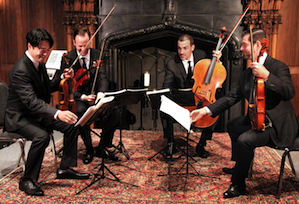
Photo by Rick Gydesen
Patricia Kristof Moy, executive director of Music at Kohl Mansion, was pleased as punch with recent audience response to the series. Asked for specifics, she proudly shared this from Rick Gydesen, an art enthusiast I remember in the Oakland Ballet administration at the glory days of that organization. The note says, in part:
As far as I'm concerned, Music at Kohl Mansion has entered the Pantheon of California presenters.As I begin to write, it's intermission of the May 4 closing concert of the season. This delightful 30-year chamber series is hosted in the Great Hall of the 100-year-old Kohl Mansion, located at the summit of the Sylvan Mercy High School campus in Burlingame.
The wonderful Henschel Quartett, based in Munich, is featured. Helmed by an attractive pair of siblings (the brother on first violin, his sister on viola), this ensemble made a startling impression from their very first notes as far as the really big sound they can produce. And not by faking it through volume, but from their remarkable depth of tone: There were moments when I swear I was hearing an entire string section.
The two classical pieces on the program received a first rate performance: the Mendelssohn E Minor, Op. 44 No. 2 (such a nice piece of music — I mean, truly lovely), and the Mozart A Major, K. 464 (the so-called "Drum", one of the six "Haydn quartets"). The Mozart (to my ears) is one of his less memorable pieces; a casual listen can go in one ear and out the other (largely because it lacks a Big Tune or memorable melodic hook.) But Herr Henschel and his compatriots managed to make it interesting, even compelling. They made you pay attention, and in the process hear why this may in fact be one of Mozart's better quartets.
But the true revelation of the evening was the contemporary piece before intermission, the 1997 Visions and Miracles by the American composer Christopher Theofanidis, who wrote the splendid music for Heart of a Soldier, the "9/11 opera" premiered at San Francisco Opera three years ago. Although I had mixed feelings about the opera itself — the libretto, and the fact that it really wasn't about 9/11 — the music was attractive, accessible, and at times, even remarkable.
And so it was this evening with this early quartet by Theofanidis. I was beyond mesmerized, it's been ages since I've heard a new piece of music that had me on the edge of my seat the way this wonderfully inventive, vivid, and intensely musical three-part suite did tonight.
But the real clincher came in retrospect during the evening's first encore: The quartet performed the final movement to Dvořák's "American Quartet," and I realized that the Theofanidis was every bit as good as the Dvořák!
And I saw something I thought I'd never see: the audience, consisting largely of elderly, conservative listeners in their 70s and 80s, gave it a standing ovation. When it's always the "modern" work on the program they complain about.
A couple of years ago Kohl presented a quartet who performed Samuel Barber, and the audience had to be carefully prepped beforehand so they wouldn't revolt. Yeah, the Barber String Quartet with its famous Adagio. You know, the one that's appeared in about a gazillion Hollywood movies. That's how spooked audiences have learned to become when it comes to modern music.
But tonight, no one was spooked. In fact, they were elated. After the concert concluded, I heard the board member say, "We need to see about doing more stuff by this Theofanidis fellow."
So I think I may have found the diamond in the coalbin after all: a contemporary "classical" composer who can actually write good music. And REAL music, not just another dreary, faceless, Pulitzer-bound piece of academia. And just when I was on the verge of concluding that it was no longer humanly possible. Look up this amazing composer.

